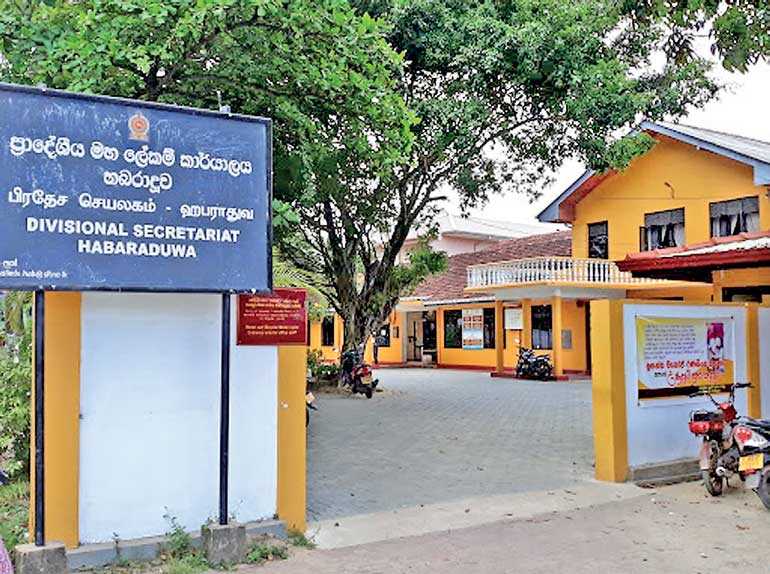Friday Feb 20, 2026
Friday Feb 20, 2026
Tuesday, 5 May 2020 00:42 - - {{hitsCtrl.values.hits}}

With the DS office as the main coordinating body, it can enhance efficiency in service delivery, stimulate economic growth, eradicate rural poverty, strengthen civil society, deepen democracy, reduce the heavy fiscal burden of the centre, and solve many different kinds of problems including environmental issues
Many countries are implementing expansionary fiscal and monetary policies to mitigate the negative impact caused by COVID-19. In Sri Lanka, the island-wide curfews have locked down human activities, generating unprecedented losses for businesses relating to the production and consumption of goods and services.
The business community plays an essential role in economic recovery because entrepreneurs are the back born of the economy and are responsible for production and generation of employment opportunities for the workers. 
The Central Bank of Sri Lanka, going with easing monetary policy, has instructed financial institutions to reduce lending interest rates enabling people to borrow. Only if the borrowers invest those borrowed money in productive business, it will lead to economic recovery.
The central Government also has transferred money for individuals with low income to compensate for the lost revenue due to lockdown. Those transfers are great reliefs to the people in the short run and perhaps not contribute to the long run economic recovery.
Whatever the traditional policies implemented by the financial institutions and the central Government, it may not generate the expected results unless those polices benefit entrepreneurs or the business community. It is necessary, therefore, to think innovative new paradigms and models for economic recovery focussing private sector business.
The third pillar as a new development model
Sub-national or local governments are implementing many central government level policy decisions at the periphery. We could see how local level Government officials closely work with the local community in providing essentials services, tracing, and isolating coronavirus infected people in the recent past. As they are effectively operating in mitigating coronavirus outbreak, with the same sprit local community can move to the next critical task of economic recovery.
Raghuram Rajan (2020), in his book titled ‘The Third Pillar: How Markets and the State Leave the Community Behind,’ explains the importance of community. The author is an economist, a distinguished professor at the University of Chicago, former IMF Chief, and former Governor of the Reserve Bank of India.
The author brilliantly describes an ongoing struggle and new perspective for balance between the three building blocks or pillars of a good society: competitive markets, state, and community. The author argues that what countries are doing now is scaling up markets and the state focusing economic and political supremacy flourishing centre and allowing periphery to decay.
According to the author, the community-the third pillar has been ignored by the other two pillars, namely markets and the state. A community “is a social group of any size whose members reside in a specific locality, share government, and often have a common cultural and historical heritage.” The local or subnational governments are parts of the community.
Divisional Secretariat as a new development centre
There are more than 14,000 villages in Sri Lanka. Most of those villages have Village Development Councils (or Grama Sanwardena Samitiyas). At the same time, every village has four to five Government officials. Sri Lanka has many sub-national governments which include 23 Municipal Councils, 42 Urban Councils, 271 Pradeshiya Sabas, and 332 Divisional Secretariats.
If the Government can find competent 332 Divisional Secretaries and they are adequately empowered, they should be able to closely work with regional police stations, health-related Government officials, the business community, financial institutions, and political leaders.
With the DS office as the main coordinating body, it can enhance efficiency in service delivery, stimulate economic growth, eradicate rural poverty, strengthen civil society, deepen democracy, reduce the heavy fiscal burden of the centre, and solve many different kinds of problems including environmental issues.
For a detailed discussion on this subject, interested readers may read an edited volume by N.S. Cooray and Sirimal Abeyratne (2017), ‘Decentralization and Development of Sri Lanka Within a Unitary State,’ Springer Singapore
Issuing Local Government bonds
The Ministry of Small and Medium Business and Enterprise Development, through the National Enterprises Development Authority, Chamber of Commerce (with its regional branches), and local financial institutions, can also help the DS office to coordinate and develop business plans for regional development.
Now the problem is the funding for identified business projects. Of course, the private sector should play a leading role in getting their funds. However, Sri Lanka has resources scarcity, because private sector savings are very small, the Government does not save (rather dis-save, because of the budget deficit). And foreign earnings from trade, tourism, remittances, investment, official development assistance, and borrowings are also limited.
Given this situation, the Government should consider issuing Local Government bonds. Many countries, including Japan, are issuing local government bonds for business developments.
(The writer is a Professor in Economics, International University of Japan, Niigata, Japan, and the President of the Association of Sri Lankan Academics in Japan.)